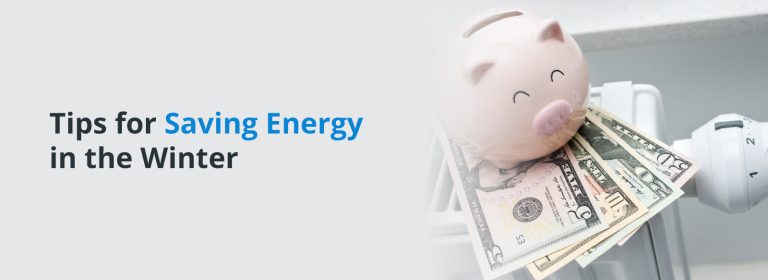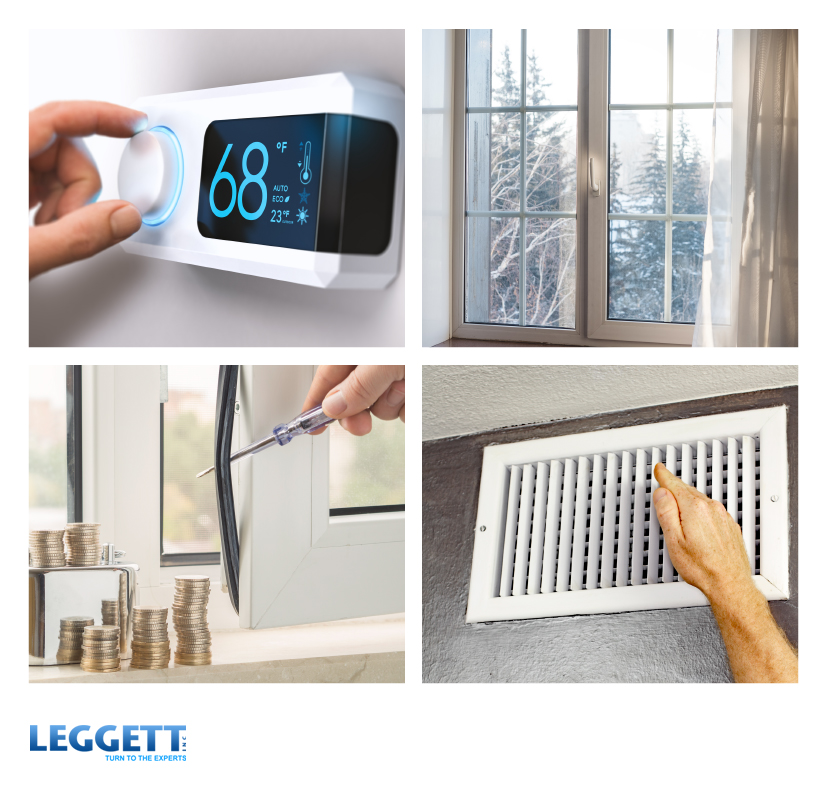
There are many ways for you to save energy in the winter to lower your heating bills. A few obvious ways to reduce your costs include decreasing the thermostat temperature and considering wearing more layers of clothing. Before you do those things, read our tips to save energy so you don’t have to sacrifice being comfortable in your own home.
These winter energy tips may have a small impact individually. Still, using multiple strategies together can make a great impact to help you lower your Camp Hill heating bill. Take control of your heating expenses in Central Pennsylvania and become an efficient household.
1. Use Modern Thermostats
With modern thermostats, you have more control over your environment at home. You can create temperature preferences that suit your schedule and comfort level.
If you’re working during the day and home at night, you can save on your heating bill by setting a preference that stops heating when you’re at work and starts when you are on your way home. You can control heat flow anywhere you are on your phone or computer without being home.
Modern thermostats offer increased connectivity, saving you money by having better efficiency and more control over temperature fluctuations. On some thermostats, you can see how much energy you are using and if there are service issues that need to be addressed by using their energy tracking capabilities. If you immediately take action on service issues and schedule a technician to fix your heating unit, you can save on heating bill costs and prevent more expensive repairs down the line.
Tracking the humidity in your house can also be an important step to saving on heating bills. Your body reacts to the humidity level in your house. You may think your house is humid or dry so you adjust the temperature instead of the humidity level. This can increase your overall energy consumption and cost you on your heating bill.

2. Harness the Sun
The sun provides natural warmth to help heat your house and lower winter energy costs. You can open your sun-facing blinds and curtains to let the sunshine in, naturally heat your house and close them during the night time to help keep the heat indoors. If you want to take it a step further, you can get darker-colored blinds and curtains to absorb more heat as well. Use the sun’s natural power to help you lower winter energy costs.
3. Eliminate Air Leaks and Drafts
Air leaks can come from all over your house, including doors, windows, attics, basements, fireplaces and power outlets. Seal your air leaks, eliminate drafts and lower energy costs by:
- Installing weather stripping on doors.
- Caulking windows and frame cracks.
- Wrapping vent ducts in the attic with foil-faced fiberglass insulation.
- Closing the damper in the fireplace.
- Using foam gaskets or putty to seal power outlet leaks.
- Closing all doors and vents in unused rooms.
Although sealing air leaks and eliminating drafts may seem like small contributions, doing these things can save a significant amount of energy in the winter. You can use a thermal imager to make it easier to find the cold spots in your house, or you can schedule an energy audit to fix the leaks and drafts in your house.
4. Promote Air Circulation
Air circulation can increase the probability of correct temperature readings within your house. There are different ways you can circulate warm air in your house.
Do not obstruct air vents with furniture, curtains or anything that prevents air from freely expelling from vents. When the vents are obstructed, the heating system works harder than it should, increasing hot air density in your air ducts. This can cause your ducts to expand, crack and leak. If you cannot avoid blocking your vests, you can purchase inexpensive vent extenders to promote better air circulation. If you still have trouble with circulation, contact us to go through your circulation options.
We suggest running a space heater if you are in a small space like an apartment or single room. Space heaters produce a considerable amount of heat and can help you save energy in the winter. The heat can gradually circulate through and should be suitable for small areas.
For rooms with ceiling fans, switch the direction of the motor rotation to spin ceiling fan blades in the clockwise direction. Usually, the motor rotates counterclockwise. Reversing the direction pushes air up towards the ceiling. This will force the hot air trapped near the ceiling down the walls and pull the cool air up to the ceiling. If you stand under the ceiling fan and you don’t feel air blowing down onto you, you’ve done it correctly.
How to Increase Utility Efficiency and Save on Heating Bills
Your water heater is constantly heating water, which creates an excellent opportunity to save on your heating bill. Consider resetting your water heater thermostat and lowering the water temperature. Many people keep the thermostat set to 120 degrees, which is hot enough. If you’re not willing to decrease your water heater temperature, there are insulation blankets that you can pull over your water heater to reduce the amount of heat loss from the water heater.
Annually servicing your heater can help it run as efficiently as possible to help you save energy in the winter. Getting furnace and heat pump tune-ups is crucial for ensuring your system’s longevity and efficiency. Sign up for our heat-pump preventative maintenance plans or an oil furnace cleaning service and maintenance to detect issues and prevent inefficiencies.
If you have a heating system that forces air from the system, you might use air filters. Air filters clean outgoing air and collect dirt, hair and dust. It is a good idea to change your air filter as often as once a month to promote clean and efficient air circulation. If your filter is often replaced, it can help you save energy in the winter.
Exhaust fans suck out all of the unwanted air and moisture produced, like the fan above your stove and in your bathroom, but that means it also sucks out all of the hot air produced by your heating system.
If you limit your use of exhaust fans, you can save energy in the winter and keep the warm air in the house. You can decrease moisture in the air and keep your hot air by using a dehumidifier. Don’t forget to empty the water from the dehumidifier so it doesn’t overflow.

Take Control of Your Central Pennsylvania Heating Bill
We encourage you to take these tips seriously and implement them so you can save energy in the winter. If you need service or maintenance, don’t hesitate to call or set up an appointment online. You can save on Harrisburg or Camp Hill heating bills with help from a local HVAC company like Leggett.
Since 1966, Leggett has provided peace of mind for our customers. Leggett’s NATE-certified technicians specialize in professional diagnosis, up-front pricing for your repairs, preventive maintenance, and replacement systems. Leggett’s mission is to provide homes with the finest value in high-efficiency, green and high-comfort systems, air purifiers, plumbing, electrical, and home standby electric generator services available. Overwhelming customer satisfaction is our primary goal.



